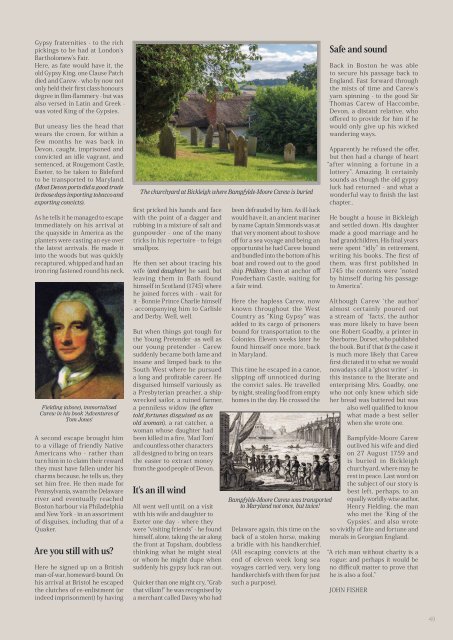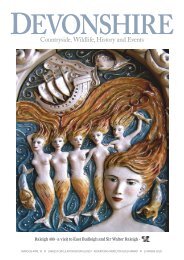Devonshire December 16 January 17
Our latest Christmas issue of Devonshire magazine!
Our latest Christmas issue of Devonshire magazine!
You also want an ePaper? Increase the reach of your titles
YUMPU automatically turns print PDFs into web optimized ePapers that Google loves.
Gypsy fraternities - to the rich<br />
pickings to be had at London’s<br />
Bartholomew’s Fair.<br />
Here, as fate would have it, the<br />
old Gypsy King, one Clause Patch<br />
died and Carew - who by now not<br />
only held their first class honours<br />
degree in flim-flammery - but was<br />
also versed in Latin and Greek -<br />
was voted King of the Gypsies.<br />
But uneasy lies the head that<br />
wears the crown, for within a<br />
few months he was back in<br />
Devon, caught, imprisoned and<br />
convicted an idle vagrant, and<br />
sentenced, at Rougemont Castle,<br />
Exeter, to be taken to Bideford<br />
to be transported to Maryland.<br />
(Most Devon ports did a good trade<br />
in those days importing tobacco and<br />
exporting convicts).<br />
As he tells it he managed to escape<br />
immediately on his arrival at<br />
the quayside in America as the<br />
planters were casting an eye over<br />
the latest arrivals. He made it<br />
into the woods but was quickly<br />
recaptured, whipped and had an<br />
iron ring fastened round his neck.<br />
Fielding (above), immortalised<br />
Carew in his book 'Adventures of<br />
Tom Jones'<br />
A second escape brought him<br />
to a village of friendly Native<br />
Americans who - rather than<br />
turn him in to claim their reward<br />
they must have fallen under his<br />
charms because, he tells us, they<br />
set him free. He then made for<br />
Pennsylvania, swam the Delaware<br />
river and eventually reached<br />
Boston harbour via Philadelphia<br />
and New York - in an assortment<br />
of disguises, including that of a<br />
Quaker.<br />
<br />
Here he signed up on a British<br />
man-of-war, homeward-bound. On<br />
his arrival at Bristol he escaped<br />
the clutches of re-enlistment (or<br />
indeed imprisonment) by having<br />
The churchyard at Bickleigh where Bampfylde-Moore Carew is buried<br />
first pricked his hands and face<br />
with the point of a dagger and<br />
rubbing in a mixture of salt and<br />
gunpowder - one of the many<br />
tricks in his repertoire - to feign<br />
smallpox.<br />
He then set about tracing his<br />
wife (and daughter) he said, but<br />
leaving them in Bath found<br />
himself in Scotland (<strong>17</strong>45) where<br />
he joined forces with - wait for<br />
it - Bonnie Prince Charlie himself<br />
- accompanying him to Carlisle<br />
and Derby. Well, well.<br />
But when things got tough for<br />
the Young Pretender -as well as<br />
our young pretender - Carew<br />
suddenly became both lame and<br />
insane and limped back to the<br />
South West where he pursued<br />
a long and profitable career. He<br />
disguised himself variously as<br />
a Presbyterian preacher, a shipwrecked<br />
sailor, a ruined farmer,<br />
a penniless widow (he often<br />
told fortunes disguised as an<br />
old woman), a rat catcher, a<br />
woman whose daughter had<br />
been killed in a fire, ʻMad Tom’<br />
and countless other characters<br />
all designed to bring on tears<br />
the easier to extract money<br />
from the good people of Devon.<br />
<br />
All went well until, on a visit<br />
with his wife and daughter to<br />
Exeter one day - where they<br />
were “visiting friends” - he found<br />
himself, alone, taking the air along<br />
the front at Topsham, doubtless<br />
thinking what he might steal<br />
or whom he might dupe when<br />
suddenly his gypsy luck ran out.<br />
Quicker than one might cry, “Grab<br />
that villain!” he was recognised by<br />
a merchant called Davey who had<br />
been defrauded by him. As ill-luck<br />
would have it, an ancient mariner<br />
by name Captain Simmonds was at<br />
that very moment about to shove<br />
off for a sea voyage and being an<br />
opportunist he had Carew bound<br />
and bundled into the bottom of his<br />
boat and rowed out to the good<br />
ship Phillory, then at anchor off<br />
Powderham Castle, waiting for<br />
a fair wind.<br />
Here the hapless Carew, now<br />
known throughout the West<br />
Country as “King Gypsy” was<br />
added to its cargo of prisoners<br />
bound for transportation to the<br />
Colonies. Eleven weeks later he<br />
found himself once more, back<br />
in Maryland.<br />
This time he escaped in a canoe,<br />
slipping off unnoticed during<br />
the convict sales. He travelled<br />
by night, stealing food from empty<br />
homes in the day. He crossed the<br />
Bampfylde-Moore Carew was transported<br />
to Maryland not once, but twice!<br />
Delaware again, this time on the<br />
back of a stolen horse, making<br />
a bridle with his handkerchief.<br />
(All escaping convicts at the<br />
end of eleven week long sea<br />
voyages carried very, very long<br />
handkerchiefs with them for just<br />
such a purpose).<br />
<br />
Back in Boston he was able<br />
to secure his passage back to<br />
England. Fast forward through<br />
the mists of time and Carew’s<br />
yarn spinning - to the good Sir<br />
Thomas Carew of Haccombe,<br />
Devon, a distant relative, who<br />
offered to provide for him if he<br />
would only give up his wicked<br />
wandering ways.<br />
Apparently he refused the offer,<br />
but then had a change of heart<br />
“after winning a fortune in a<br />
lottery”. Amazing. It certainly<br />
sounds as though the old gypsy<br />
luck had returned - and what a<br />
wonderful way to finish the last<br />
chapter..<br />
He bought a house in Bickleigh<br />
and settled down. His daughter<br />
made a good marriage and he<br />
had grandchildren, His final years<br />
were spent “idly” in retirement,<br />
writing his books. The first of<br />
them, was first published in<br />
<strong>17</strong>45 the contents were "noted<br />
by himself during his passage<br />
to America”.<br />
Although Carew ʻthe author’<br />
almost certainly poured out<br />
a stream of ʻfacts’, the author<br />
was more likely to have been<br />
one Robert Goadby, a printer in<br />
Sherborne, Dorset, who published<br />
the book. But if that is the case it<br />
is much more likely that Carew<br />
first dictated it to what we would<br />
nowadays call a “ghost writer’ - in<br />
this instance to the literate and<br />
enterprising Mrs. Goadby, one<br />
who not only knew which side<br />
her bread was buttered but was<br />
also well qualified to know<br />
what made a best seller<br />
when she wrote one.<br />
Bampfylde-Moore Carew<br />
outlived his wife and died<br />
on 27 August <strong>17</strong>59 and<br />
is buried in Bickleigh<br />
churchyard, where may he<br />
rest in peace. Last word on<br />
the subject of our story is<br />
best left, perhaps, to an<br />
equally worldly-wise author,<br />
Henry Fielding, the man<br />
who met the ʻKing of the<br />
Gypsies’. and also wrote<br />
so vividly of fate and fortune and<br />
morals in Georgian England.<br />
“A rich man without charity is a<br />
rogue: and perhaps it would be<br />
no difficult matter to prove that<br />
he is also a fool.”<br />
JOHN FISHER<br />
49


















